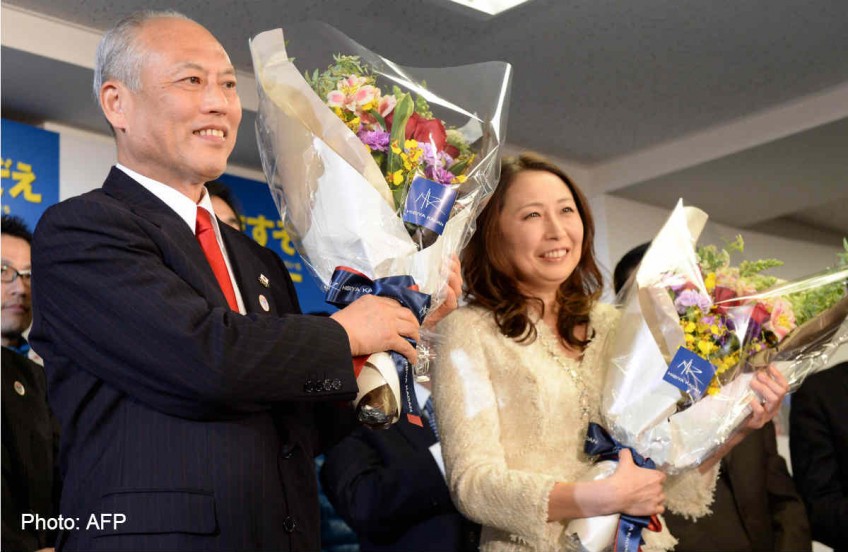Tokyo governor passes on Japan PM's goodwill on China visit

BEIJING - Tokyo's governor said on Saturday that he had passed on a message from Japanese Prime Minister Shinzo Abe to Chinese leaders that Abe wants relations to improve, during a rare high-level visit as bilateral ties continue to sour.
Governor Yoichi Masuzoe, who was Abe's favoured candidate during the governor election in February, said he delivered the message on behalf of Abe to China's Vice Premier Wang Yang and former top Chinese diplomat Tang Jiaxuan.
Masuzoe said Wang told him in turn to pass on a message that Japanese leaders needed to both speak and act more cautiously.
The 65-year-old Masuzoe is at the end of a three-day visit to China that analysts have said had the potential to open an alternate channel of dialogue between the countries. "In my meetings with Chinese leaders, I said that Prime Minister Abe totally supported my visit, and that he hoped Sino-Japan relations could take a turn for the better," Masuzoe said at a news conference. "If this can even help just a little to dispel some misunderstandings or areas where there is not enough understanding, then this will be the best thing about my visit." However, Masuzoe said he had not passed on any formal letter from the Japanese government to Chinese leaders.
Local Japanese politicians have in the past played a part in efforts to repair Japan's ties with China.
In 1971, when the government of Prime Minister Eisaku Sato was keen to normalize ties with Beijing, the Socialist governor of Tokyo Ryokichi Minobe, was asked to deliver to Chinese leaders a letter from the ruling Liberal Democratic Party (LDP) secretary-general.
China would not, however, accept the letter, historical accounts say. Sino-Japan diplomatic ties were not normalised until 1972, under Sato's successor, Kakuei Tanaka.
Ties have been strained by a territorial dispute over a string of tiny islets in the East China Sea, known as the Diaoyu to the Chinese and the Senkaku to the Japanese, and Abe's visit last year to the controversial Yasukuni Shrine, where Japanese war criminals are honoured among the country's war dead.
Masuzoe said Wang had told him that "Japanese politicians ought to speak and act cautiously, and not do anything to hinder the development of cooperative relations".
Masuzoe told Wang he would pass this message to Abe. "He (Wang) said that no matter whether Chinese people or Japanese people, they all want to get along in a friendly way,"Masuzoe said, adding that he told Wang that he agreed with him.
State news agency Xinhua quoted Wang as telling Masuzoe that"China has the ability to respond to any provocation, maintain the fruits of victory from World War Two and the post-war international order".
Masuzoe told Abe in early April that he hoped his visit to Beijing would help improve bilateral relations. "I told this to the Chinese leaders that Prime Minister Abe supported and understood my desire to push city-to-city diplomacy," he said.
Masuzoe's announcement came as two Chinese ships entered waters near the disputed islands for the first time in two weeks, the Kyodo news agency reported.
It also came five days after Abe made an offering to Yasukuni Shrine, prompting China to question Japan's commitment to dialogue.
On Friday, US President Barack Obama wrapped up a state visit to Japan during which he assured Tokyo that Washington would come to its defence, including of the disputed isles with China, because of its defence treaty. Those comments drew a swift rebuke from Beijing.
Masuzoe said he did not discuss the US-Japan security treaty with Wang, who was the most senior Chinese leader he met.
Compounding China's suspicion of Japan is the belief that Abe is intent on revising the pacifist constitution that Japan adopted after its World War Two defeat.
Relations have long been soured by Chinese resentment of Japan's wartime occupation of large parts of China and the belief that Japan has never properly atoned for its actions.
Masuzoe said he discussed with the Beijing Mayor Wang Anshun about how Tokyo can help in the battle against pollution and how Tokyo can learn from Beijing's experience at hosting an Olympics. Tokyo will host the summer Olympics in 2020.